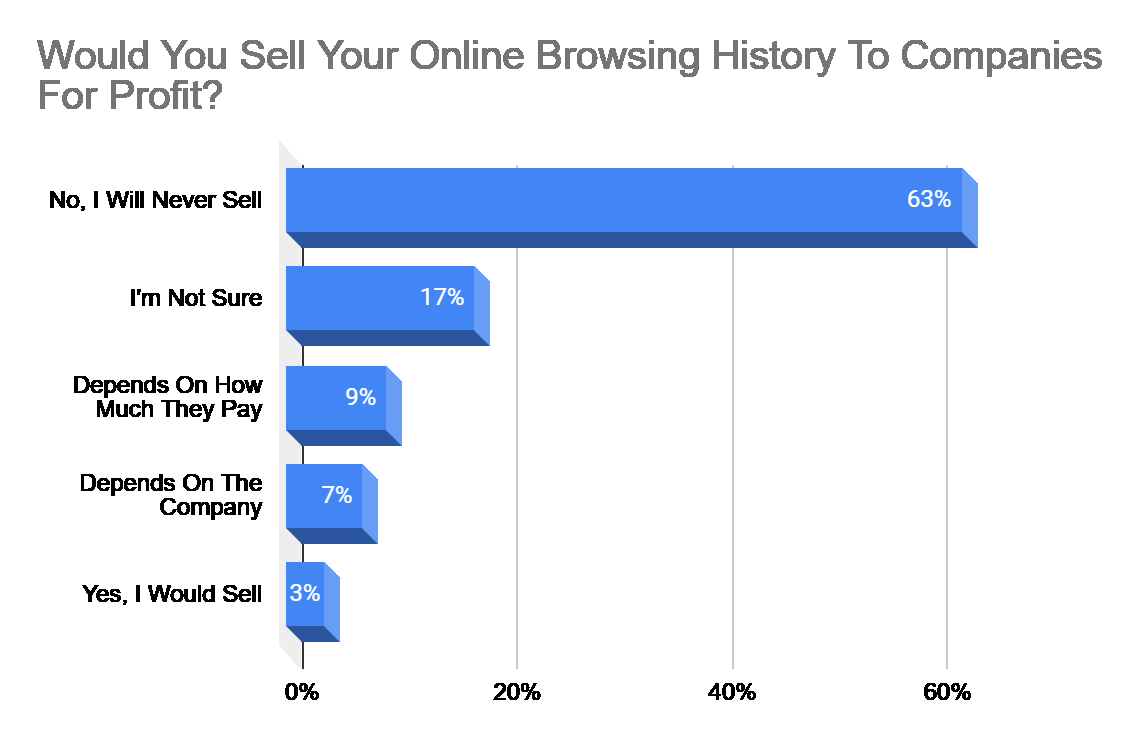
The vast majority of people would never sell their personal data for a profit, according to a new survey released on Monday.
The survey, conducted by the small consumer protection site Consumer Champion revealed that 63% of respondents would not sell their data. Only 3% of respondents said they would; 9% said it would depend on the price.
In the controversy over data privacy and data protection, advertisers are soon going to have to find new ways to target their intended audiences. New regulations in place like the European Union’s General Data Protection Regulation (GDPR) and California’s California Consumer Privacy Act (CCPA) are intended to give internet users more information about what has happened to their data, and, ideally, opt out of such use if they so wish.
But the idea of customers actively selling their own data to advertisers for money is a relatively new proposal, even if it’s one that might not gain much traction right now, if this survey is to be believed.
The survey asked only one question — “Would you sell your online data for profit?” — and had a sample size of 2,000, which is not the most statistically representative number for the U.S. But it did sample from all regions of the country and all age groups over 18, according to data sent to Digital Trends.

Benyamin Abadi, content manager for Customer Champion, told Digital Trends that eventually they would like to do surveys “on a larger scale” but a limited budget right now prevents that (the site launched in September 2019).
“With things like CCPA and Google cookies, we wanted to see what people would say,” Abadi told Digital Trends, and he also said he was surprised by the result. “Honestly, I thought they were going to say yes, they would sell, but I guess people’s data is very precious to them.”
The unspoken trade-off that many people don’t think about is that we’re already trading in our personal information for the services that are essential to the internet. Companies like Facebook and Google give users their product for free in exchange for their personal information, which in turn is used for ad targeting (to the tune of billions of dollars).
The bigger question
A one-question survey won’t reveal everything about American consumer attitudes. “There are different kinds of data,” said Umesh Padval, a partner at Thomvest Ventures and cybersecurity investor. “If you’re asking for my social security number, my credit card number, my age, I’m sensitive about those things. I wouldn’t sell those.”
But less essential information about where he’s traveled or what kind of shoes he likes, that he’d be willing to part with. “10 years ago I used to get ads for hotels in Timbuktu and women’s shoes. It was annoying,” Padval told Digital Trends. “But now the top five ads I see are pretty well targeted. They know where I shop, where I travel, and I find it useful. It’s made my shopping experience much better, and I think it serves a purpose.”
Padval estimated that there might be some people who would be willing to part with their data for these reasons. “Some people might be happy with selling a minimum of information that will make their job easier, or get them deals,” he said.
“The question to ask is, who is sharing my data, why, under what terms, and how is that data being managed,” said Dawn Barry, president and co-founder of LunaPBC, a data-sharing platform for medical and health data that already, in a way, pays people for their data. People can voluntarily and anonymously submit data about their health issues to the Luna platform. Nonprofit and for-profit companies that need data for discovery and research will pay Luna for access, and if there’s any profit to be had, Luna will split the fee among those whose data was used. Users can also revoke their information at any time.
“There’s no doubt that there’s a rising consumer sentiment regarding use of their data,” Barry told DT. “We’ve evolved from ‘these tools are cool!’ and not knowing what questions to ask, to knowing what to ask about our data in the course of buying a product.”
Barry said that in the wake of GDPR and CCPA, data-buying relationships were likely to become fraught. “The landscape is absolutely changing,” she said. “I do believe people are willing to use data for the greater good, but giving it away and not knowing where it’s going, it’s not a wise decision.”



